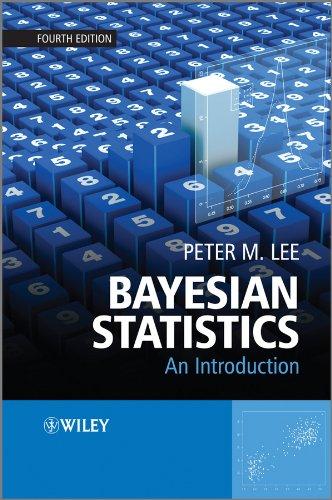Suppose that you have grounds for believing that observations x i , y i for i =
Question:
Suppose that you have grounds for believing that observations xi, yi for i = 1, 2 ... , n are such that xi ~ N(θ, ϕi ) and also yi ~ N(θ,ϕi ) but that you are not prepared to assume that the ϕi are equal. What statistic would you expect to base inferences about θ on?
Fantastic news! We've Found the answer you've been seeking!
Step by Step Answer:
Answer rating: 100% (2 reviews)
Given that the observations xi and yi are normally distributed with mean and variances i and i respe...View the full answer

Answered By

FREDRICK MUSYOKI
Professional Qualities:
Solution-oriented.
Self-motivated.
Excellent problem-solving and critical thinking skills.
Good organization, time management and prioritization.
Efficient troubleshooting abilities.
Tutoring Qualities:
I appreciate students as individuals.
I am used to tailoring resources for individual needs.
I can integrate IT into student's lessons.
I am good at explaining concepts.
I am able to help students progress.
I have a wide curriculum knowledge.
5.00+
1+ Reviews
10+ Question Solved
Related Book For 

Question Posted:
Students also viewed these Business questions
-
Have you ever wondered if a college education is financially worthwhile? The U.S. Census Bureau collects data on income and education that throws some light on this question. A recent census...
-
The following is an actual promotional pamphlet prepared by Trust Company Bank in Atlanta, Georgia: "Lower your monthly car payments as much as 48%." Now you can buy the car you want and keep the...
-
Suppose that you have just been hired as a part-time clerk in a large department store. Each week you work three evenings and all day Saturday. Without the income provided by this job, you would be...
-
Suppose 2 x - T f(x) -1-cos z for all real numbers z. Find lim f(x) PIK 2) Use the Squeeze Theorem to evaluate the limit lim 2 sin()
-
Does pension expense include the actual return on plan assets or the expected return? Explain.
-
Steve Grant, the new controller of Greenbriar Company, has reviewed the expected useful lives and salvage values of selected depreciable assets at the beginning of 2014. His findings are as follows....
-
SWIGART v. BRUNO CALIFORNIA COURT OF APPEALS 13 CAL. APP. 5TH 529 2017 According to the American Endurance Ride Conference, endurance riding is a highly competitive and demanding sport. It is...
-
Normal heptane is dehydrocyclicized to toluene and hydrogen in a continuous vapor-phase reaction: C7H16 C6H5CH3 +4 H2 Pure heptanes at 400C is fed to the reactor. The reactor operates isothermally...
-
Describe persistence design under NoSQL technologies.? What is NoSQL polyglot persistence?
-
How much difference would it make to the analysis of the data in Section 5.1 on rat diet if we took = ( + ) instead of = + .
-
With the same data as in the previous question, test the hypothesis that there is no discrepancy between the two analysts. Previous question Two analysts measure the percentage of ammonia in a...
-
On January 2, 20X8, Primary Corporation acquired 100 percent of Secondary Companys outstanding common stock. In exchange for Secondarys stock, Primary issued bonds payable with a par and fair value...
-
What are the implications of open innovation strategies for reshaping traditional approaches to value creation and competitive positioning within ecosystems of collaborators and competitors?
-
Question: Since December 15, 2007, Decree No. 32/2007/NQ-CP officially takes force and starts helmets when sitting on motorbikes and motorbikes. This has greatly affected the business activities of...
-
In the past couple of decades, workplace violence, specifically gun violence, seems to be more pervasive within the United States. Using your HR hat, how could an HR shop within an organization help...
-
Mada Seghete of Branch ( www.branch.io ) has literally written a handbook on mobile growth in the cross platform age. In the attached 18-minute Ted Talk, she will shares the mobile strategies that...
-
What strategies can be employed to foster a culture of ethical mindfulness and moral courage within organizations, enabling employees to navigate ethical challenges with integrity and moral...
-
Phillips Corporation, which manufactures shoes, hired a recent college graduate to work in its accounting department. On the first day of work, the accountant was assigned to total a batch of...
-
Use the information given about the angles and to find the exact value of: (a) sin( + ) (b) cos( + ) (c) sin( - ) (d) tan ( + ) (e) sin(2) (f) cos (2) (g) sin /2 (h) cos/2 cos = 4/5, 0 < < /2; cos =...
-
The government market is obviously an extremely large one, yet it is often slighted or even ignored by many firms. Red tape is certainly one reason, but there are others. Discuss the situ a tion and...
-
The government market is obviously an extremely large one, yet it is often slighted or even ignored by many firms. Red tape is certainly one reason, but there are others. Discuss the situ a tion and...
-
Some critics argue that the Foreign Corrupt Practices Act puts U.S. businesses at a disa d vantage when competing in foreign markets with suppliers from other countries that do not have similar laws....
-
1. Differentiate between Software Process and Software Practices 2. Describe the importance of the principles that Guide Process 3. How Communication Principle is different from planning principles...
-
6. Use the table below, based on data from students enrolled in BMGT 230 this semester, to answer/complete parts a. through e. (the cell values are frequencies): Sex Political Attitude Male Female...
-
In 500 words or more for each question, please answer the following questions. Do you agree with the philosophy of technological realism? what definition would you share with a layman? Explain the...

Study smarter with the SolutionInn App


